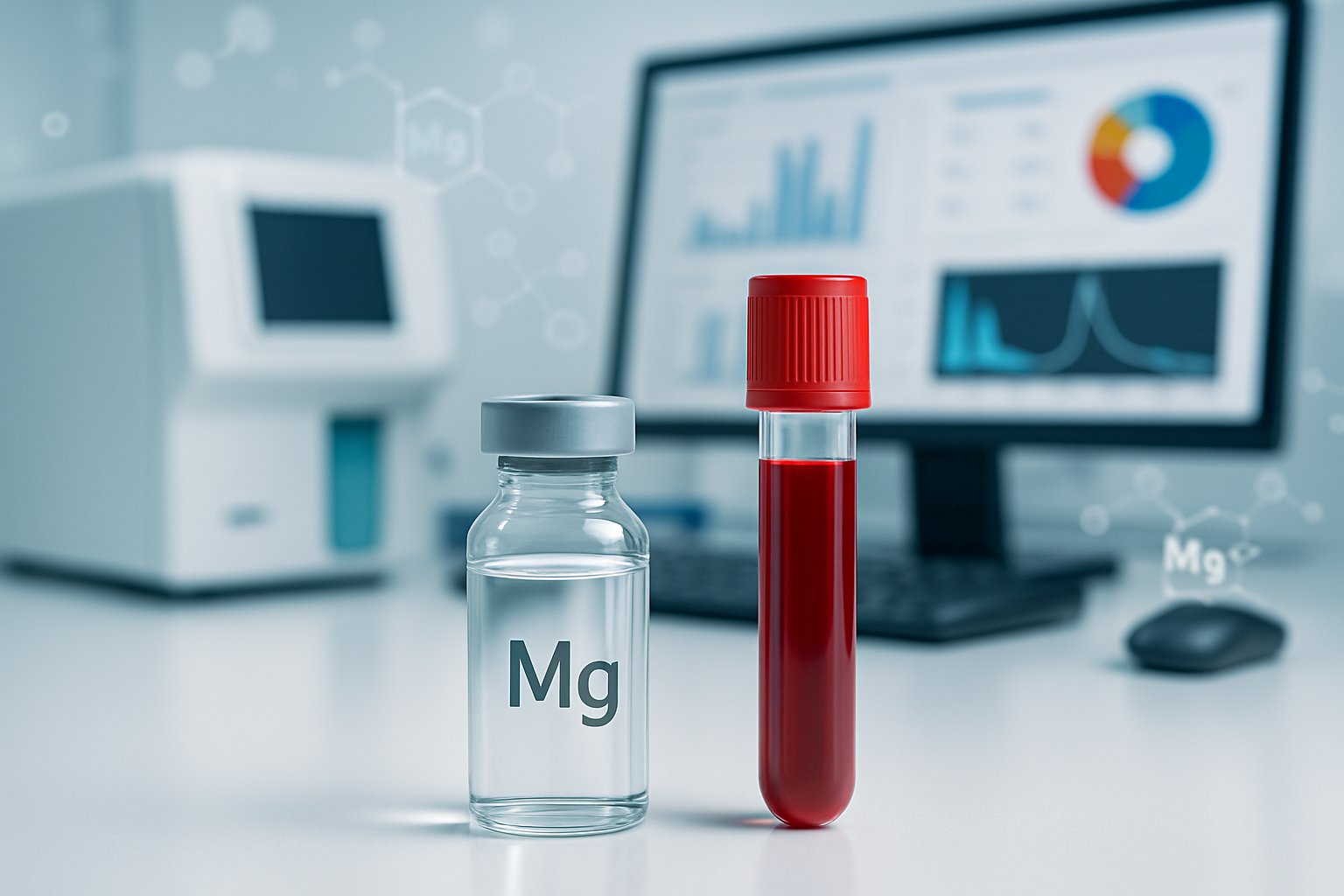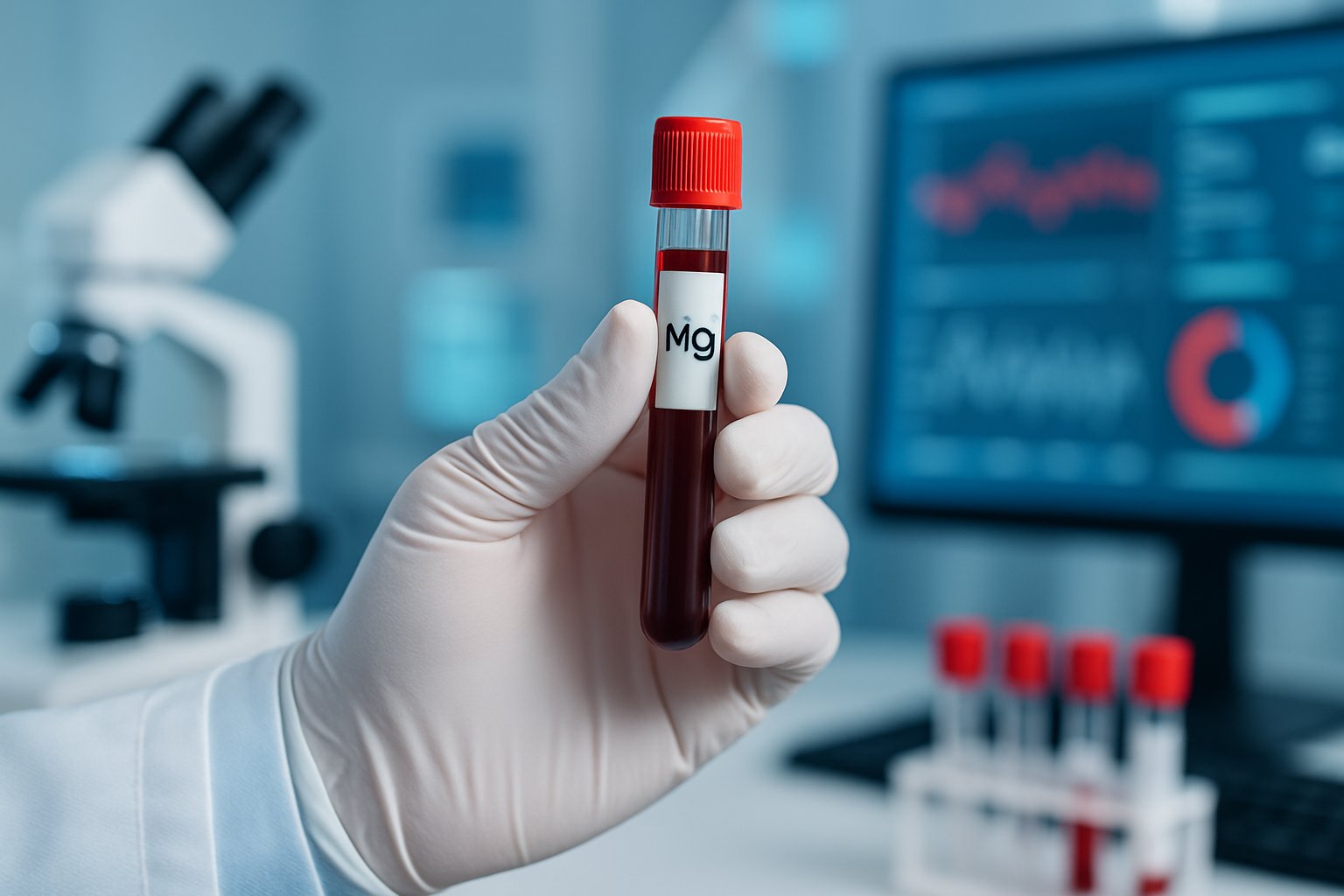High magnesium in the blood, called hypermagnesemia, is a rare condition that most often occurs in people with kidney problems or those taking too much magnesium through supplements or medications. When magnesium levels become too high, it can cause muscle weakness, low blood pressure, difficulty breathing, and in severe cases can be life-threatening.

Most people don’t experience problems from high magnesium levels[1] because healthy kidneys remove excess magnesium from the body. However, when the kidneys can’t filter properly or when someone takes large amounts of magnesium-containing products, levels can build up in the bloodstream.
The condition can be tricky to spot early because symptoms often look like other health problems. Normal magnesium levels range from 1.7 to 2.3 mg/dL[2] in healthy adults, and getting proper medical testing is the only way to know if levels are too high.
Key Takeaways
- High magnesium in blood mainly affects people with kidney disease or those taking excessive magnesium supplements
- Symptoms include muscle weakness, breathing problems, and dangerously low blood pressure that can be fatal
- Blood tests are needed to diagnose the condition since symptoms can look like other health issues
What Is High Magnesium in the Blood?
Hypermagnesemia is a rare condition[1] where the body has too much magnesium in the bloodstream. This electrolyte disorder typically occurs when kidneys cannot properly remove excess magnesium from the blood.
Definition of Hypermagnesemia
Hypermagnesemia occurs when magnesium levels in the blood become higher than normal. This rare electrolyte disorder[1] means the body cannot get rid of extra magnesium properly.
Most people with hypermagnesemia have kidney problems. Their kidneys cannot filter out excess magnesium like healthy kidneys do.
The condition is uncommon without magnesium supplements or kidney failure[3]. When it happens, patients often show no symptoms at first.
Common causes include:
- Kidney failure
- Taking too many magnesium supplements
- Certain medications
- IV magnesium treatments
The body normally keeps very little magnesium in the blood. Most magnesium stays stored in bones and muscles instead.
Normal and High Blood Magnesium Levels
Normal blood magnesium levels range from 1.7 to 2.2 mg/dL. When magnesium levels rise above 3.6 mg/dL[3], doctors consider this hypermagnesemia.
Magnesium level ranges:
| Level | Range (mg/dL) | Status |
|---|---|---|
| Normal | 1.7-2.2 | Healthy |
| Mild High | 2.3-3.5 | Usually no symptoms |
| High | 3.6+ | May cause symptoms |
Most cases of high magnesium are mild. Patients typically show no symptoms when levels stay below 3.6 mg/dL[3].
Healthcare providers do not routinely check magnesium levels. This makes the condition hard to catch early.
Role of Magnesium and Electrolytes
Magnesium is the fourth most common mineral in the body[2]. It works as an important electrolyte that helps many body functions.
Key functions of magnesium:
- Controls blood pressure
- Supports immune system
- Helps muscles move properly
- Manages blood sugar levels
- Builds strong bones
Bones contain about half of the body’s total magnesium[2]. The rest stays in muscles and other tissues.
Electrolytes like magnesium carry electric charges in body fluids[4]. They help nerves send signals and muscles contract.
The kidneys control how much magnesium stays in the blood. They filter excess magnesium and remove it through urine. When kidneys fail, magnesium builds up in the bloodstream.
Causes of High Magnesium Levels

High magnesium levels typically result from kidney problems that prevent proper magnesium removal or from taking too much magnesium through supplements and medications. Most cases involve kidney failure[1] as the primary underlying cause.
Kidney Disease and Renal Failure
Kidney failure represents the major cause[5] of high magnesium levels in the blood. Healthy kidneys filter out excess magnesium through urine production.
When kidney function declines, this filtering process becomes impaired. The kidneys cannot remove magnesium at normal rates.
Common kidney-related causes include:
- Chronic kidney disease
- Acute renal failure
- End-stage kidney disease
- Severe dehydration affecting kidney function
People with kidney problems often develop high magnesium gradually. Their bodies accumulate magnesium over time as kidney function worsens.
Patients on dialysis may also experience magnesium imbalances. The dialysis process affects how electrolytes move through the body.
Magnesium Supplements and Medications
Taking more magnesium than recommended[6] can raise blood levels too high. This happens most often with supplements, antacids, and laxatives.
High-risk medications include:
- Magnesium-containing antacids
- Magnesium-based laxatives
- High-dose magnesium supplements
- Some heartburn medications
Children face particular risks from accidental overdoses. Magnesium supplements and antacids should stay out of reach[6] of young children.
People with normal kidney function rarely develop problems from dietary magnesium. Food sources typically do not cause dangerous elevations.
However, combining multiple magnesium sources increases risk. Someone taking antacids plus laxatives plus supplements may consume excessive amounts.
Underlying Health Conditions
Several medical conditions can trigger high magnesium levels beyond kidney disease. These conditions affect how the body processes or releases magnesium.
Medical conditions that may cause high magnesium:
- Tumor lysis syndrome during cancer treatment
- Severe burns covering large body areas
- Diabetic ketoacidosis in advanced stages
- Hypothyroidism affecting metabolism
Tumor lysis syndrome occurs when cancer cells break down rapidly. This releases large amounts of magnesium into the bloodstream quickly.
Some medications used during medical treatments can also contribute. Certain IV fluids contain magnesium that may accumulate in vulnerable patients.
Elderly patients often face higher risks due to multiple factors. They may have reduced kidney function plus take several magnesium-containing medications simultaneously.
Symptoms of High Magnesium in Blood

High magnesium symptoms depend on blood levels and develop gradually as concentrations increase. Clinical symptoms typically appear when plasma magnesium exceeds 4.8 mg/dL[3], progressing from mild weakness to life-threatening complications.
Mild Hypermagnesemia Symptoms
Mild hypermagnesemia often produces subtle symptoms that patients may overlook. The body initially tolerates elevated magnesium levels without obvious signs.
Early warning signs include:
- Nausea and vomiting
- Muscle weakness in arms and legs
- Decreased deep tendon reflexes
- Mild confusion or mental fog
Patients frequently experience gastrointestinal upset first. Nausea appears before other symptoms develop.
Muscle weakness starts gradually. People notice difficulty lifting objects or climbing stairs.
Reflexes become less responsive during physical exams. Doctors test knee and ankle reflexes to assess magnesium levels.
Constipation develops as magnesium affects intestinal muscle function. Bowel movements become less frequent and more difficult.
Some patients report mild dizziness or headaches. These symptoms worsen as magnesium levels continue rising.
Severe Hypermagnesemia Effects
Severe hypermagnesemia creates dangerous complications requiring immediate medical attention. Symptoms include hypotension, respiratory depression, and cardiac arrest[5].
Critical symptoms include:
- Extremely low blood pressure
- Slow or shallow breathing
- Heart rhythm problems
- Loss of consciousness
Blood pressure drops significantly as magnesium affects blood vessels. Patients may feel lightheaded or faint when standing.
Breathing becomes labored and slow. Respiratory muscles weaken, reducing oxygen intake.
Heart function deteriorates rapidly. The electrical system controlling heartbeats becomes disrupted.
Patients may lose consciousness or enter a coma. Brain function decreases as magnesium interferes with nerve signals.
Severe cases can be fatal[1] without prompt treatment. Emergency medical care becomes essential at this stage.
Neurological and Muscular Manifestations
High magnesium primarily affects the nervous system and muscle function. These symptoms progress predictably as blood levels increase.
Neurological effects include:
- Progressive confusion and disorientation
- Difficulty concentrating or thinking clearly
- Drowsiness leading to coma
- Loss of coordination
Confusion develops gradually but becomes severe. Patients struggle with basic decision-making and memory.
Mental processing slows considerably. Simple tasks become challenging or impossible to complete.
Drowsiness progresses to stupor and eventually coma. Consciousness levels decrease as magnesium levels rise.
Muscular symptoms include:
- Profound muscle weakness throughout the body
- Complete loss of reflexes
- Difficulty swallowing or speaking
- Paralysis in extreme cases
Muscle weakness becomes debilitating. Patients cannot perform normal daily activities.
Reflexes disappear entirely at high magnesium levels. This creates a medical emergency requiring immediate intervention.
Health Complications from Excess Magnesium

High magnesium levels can cause serious problems throughout the body, affecting the heart, breathing, and digestive system. Severe cases can be fatal[1] without proper treatment.
Low Blood Pressure and Heart Effects
Excess magnesium disrupts the heart’s normal electrical activity. The mineral interferes with nerve signals that control heartbeat and blood pressure.
Low blood pressure develops[2] as magnesium relaxes blood vessel walls too much. This can make patients feel dizzy or weak.
Heart rhythm problems become common with high magnesium levels:
- Irregular heartbeat (arrhythmias)
- Slow heart rate (bradycardia)
- Abnormal electrical patterns
High doses can disrupt the heart’s electrical system[7], which is especially dangerous for people with existing heart conditions. Patients may experience chest pain or heart palpitations.
The most serious risk is cardiac arrest. Excess magnesium could lead to cardiac arrest[7] in severe cases when the heart stops beating properly.
Respiratory Issues
High magnesium levels can slow down or stop normal breathing. The mineral affects the muscles and nerves that control breathing.
Respiratory depression occurs when breathing becomes shallow or slow. Difficulty breathing[8] can develop as muscle weakness spreads to the chest and diaphragm.
Patients may show these breathing problems:
- Shallow breathing
- Slow breathing rate
- Trouble taking deep breaths
The respiratory muscles become weak and may not work properly. This creates a dangerous situation where the body cannot get enough oxygen.
Severe cases can progress to complete respiratory failure. Emergency treatment is needed to prevent death from lack of oxygen.
Gastrointestinal and Nervous System Consequences
The digestive system reacts quickly to excess magnesium. Diarrhea and abdominal cramps[8] are often the first signs patients notice.
Intestinal effects include:
- Severe diarrhea
- Stomach cramps
- Nausea and vomiting
- Intestinal paralysis in severe cases
Intestinal paralysis happens when the gut muscles stop working. Food cannot move through the digestive system normally.
The nervous system also suffers from magnesium toxicity. Nerve signals become disrupted throughout the body.
Nervous system symptoms:
- Muscle weakness
- Loss of reflexes
- Confusion
- Drowsiness
Coma can develop in the most severe cases. Many symptoms show with disturbance in the nerves and muscle[2] of various body systems.
Mental changes progress from mild confusion to complete loss of consciousness. Immediate medical care is essential to prevent permanent damage.
Diagnosis of High Magnesium Levels

Doctors diagnose high magnesium through specific blood tests that measure serum magnesium concentration. The diagnostic process involves comparing test results to established reference ranges and conducting additional evaluations to identify underlying causes.
Blood Testing and Interpretation
Blood tests are the primary method[2] for diagnosing high magnesium levels in patients. Healthcare providers order a serum magnesium test when patients show symptoms like muscle weakness, irregular heartbeat, or breathing problems.
The test measures the amount of magnesium dissolved in the blood plasma. Most laboratories use automated analyzers to provide accurate readings within hours of sample collection.
Healthcare providers consider the patient’s medical history when interpreting results. Kidney disease patients often show elevated levels because their kidneys cannot remove excess magnesium effectively.
Doctors may order repeat tests to confirm abnormal results. Single elevated readings do not always indicate a true magnesium disorder.
Laboratory Reference Ranges
Normal blood plasma magnesium ranges between 1.7 and 2.3 mg/dL[2] for healthy adults. Different laboratories may use slightly different reference ranges based on their testing methods.
Hypermagnesemia occurs when serum magnesium concentration exceeds 2.6 mg/dL[5]. This represents the threshold where magnesium levels become medically significant.
Clinical symptoms typically appear when plasma magnesium exceeds 4.8 mg/dL[3]. At these levels, patients may experience serious complications affecting their heart and breathing.
Magnesium Level Classifications:
- Normal: 1.7-2.3 mg/dL
- Mild elevation: 2.4-2.6 mg/dL
- Hypermagnesemia: >2.6 mg/dL
- Symptomatic range: >4.8 mg/dL
Associated Diagnostic Evaluations
Doctors perform additional tests to identify why magnesium levels are elevated. Kidney function tests help determine if kidney failure is causing the problem.
Healthcare providers review all medications and supplements the patient takes. Magnesium-containing antacids and laxatives commonly cause elevated blood magnesium levels.
Electrolyte panels measure other minerals like calcium, potassium, and sodium. These tests show if multiple electrolyte imbalances exist together.
Doctors may order thyroid function tests since hormone disorders can affect magnesium metabolism. Urine tests help assess how well the kidneys are processing magnesium.
Medical professionals evaluate symptoms alongside laboratory results. The combination of elevated magnesium levels and specific symptoms confirms the diagnosis of hypermagnesemia.
Treatment Options and Prevention Strategies

Treatment for hypermagnesemia[6] focuses on removing excess magnesium from the body and addressing the underlying cause. Medical professionals use specific medications and procedures to lower dangerous magnesium levels quickly.
Immediate Medical Interventions
Doctors act fast when magnesium levels become dangerously high. Calcium gluconate is the first treatment[9] doctors give through an IV.
This medication works by blocking magnesium’s harmful effects on the heart and muscles. Calcium gluconate does not lower magnesium levels directly but protects vital organs.
Medical teams monitor heart rhythm and breathing closely. High magnesium can cause the heart to beat too slowly or stop breathing.
Emergency treatments include:
- IV calcium gluconate (10-20 mL of 10% solution)
- Oxygen support if breathing slows
- Heart monitoring with ECG machines
- Blood pressure support with IV fluids
Medications and Dialysis
Diuretics help the kidneys remove extra magnesium[10] from the blood. Furosemide is the most common diuretic used for this purpose.
These water pills only work if the kidneys function normally. Patients with kidney failure cannot use diuretics effectively.
Hemodialysis becomes necessary for severe cases[1] or when kidneys have failed. This machine filters magnesium directly from the blood.
Treatment options by severity:
| Magnesium Level | Treatment Method |
|---|---|
| Mild elevation | Stop magnesium sources |
| Moderate | Diuretics + calcium |
| Severe | Dialysis + calcium gluconate |
Preventing High Magnesium Levels
Prevention starts with avoiding too much magnesium intake. People with kidney problems must stop taking magnesium supplements[2] completely.
Patients should read all medication labels carefully. Many antacids and laxatives contain high amounts of magnesium.
Common magnesium sources to avoid:
- Magnesium oxide supplements
- Milk of magnesia
- Epsom salt baths
- Some antacids and heartburn medicines
Doctors monitor blood magnesium levels regularly in high-risk patients. Those with kidney disease need frequent testing every few months.
Healthcare providers adjust medications that affect magnesium levels. They may switch patients to calcium-based antacids instead of magnesium-containing ones.
Frequently Asked Questions
High magnesium levels in blood raise specific concerns about causes, symptoms, and treatments. Most cases stem from kidney problems or medication use, with serious complications possible at extreme levels.
What can lead to elevated magnesium levels in the bloodstream?
Kidney failure is the most common cause[1] of high blood magnesium. When kidneys cannot filter properly, magnesium builds up in the blood.
Taking medications that contain magnesium can raise blood levels. This happens most often in people who already have kidney problems.
Magnesium supplements, antacids, and laxatives contribute to elevated levels. People with normal kidney function rarely develop high magnesium from these products alone.
Severe dehydration can concentrate magnesium in the blood. Burns, diabetic ketoacidosis, and certain medications like lithium may also increase levels.
What constitutes a life-threatening level of magnesium?
Normal blood magnesium ranges from 1.7 to 2.3 mg/dL[2] for healthy adults. Levels above 2.6 mg/dL indicate hypermagnesemia.
Magnesium levels above 4.8 mg/dL become dangerous. At this point, serious heart rhythm problems can occur.
Levels exceeding 7.2 mg/dL are often fatal. Severe hypermagnesemia can be fatal[1] without prompt medical treatment.
The heart may stop beating normally at extremely high levels. Breathing can also become severely impaired.
What are the potential risks associated with increased magnesium in the body?
Too much magnesium can cause diarrhea and abdominal cramps[8]. These are often the first signs people notice.
Muscle weakness develops as magnesium levels rise. Patients may feel tired and have trouble moving normally.
Heart problems become serious at high levels. Irregular heartbeat[8] can develop and become life-threatening.
Breathing difficulties occur in severe cases. Difficulty breathing[8] may require emergency medical care.
Low blood pressure and confusion can happen. These symptoms indicate the nervous system is being affected.
What medical interventions are available for managing high magnesium?
Mild cases of high magnesium typically don’t need treatment[1]. The body can often correct minor elevations on its own.
Doctors stop magnesium-containing medications immediately. This includes supplements, antacids, and laxatives that contain magnesium.
Intravenous calcium helps counteract magnesium’s effects on the heart. Calcium works quickly to protect heart function.
Dialysis removes excess magnesium from the blood. This treatment is used in severe cases or when kidneys cannot function properly.
Supportive care includes monitoring heart rhythm and breathing. Patients may need intensive care for severe cases.
How do high magnesium levels typically present symptomatically?
Early symptoms often look like other medical conditions. This makes hypermagnesemia difficult to diagnose initially.
Nausea and vomiting are common early signs. Patients may also experience loss of appetite.
Muscle weakness and fatigue develop as levels increase. People may feel unusually tired or have trouble with physical activities.
Neurological symptoms include confusion and drowsiness. Reflexes may become slower or disappear completely.
Severe symptoms affect breathing and heart function. Patients may develop low blood pressure and dangerous heart rhythms.
What factors contribute to excessive magnesium in urine?
Normal kidneys remove excess magnesium through urine. Kidneys filter most of the magnesium in blood[1] and excrete small amounts.
Healthy kidneys can clear large amounts of magnesium. This protective mechanism prevents most cases of hypermagnesemia in people with normal kidney function.
When kidneys fail, magnesium excretion drops significantly. Less magnesium leaves the body through urine, causing blood levels to rise.
Certain medications can affect how kidneys handle magnesium. Diuretics and some antibiotics may change magnesium excretion patterns.
Dehydration reduces urine production and magnesium elimination. This can contribute to higher blood magnesium concentrations.
References
- Hypermagnesemia: Causes, Symptoms & Treatment. https://my.clevelandclinic.org/health/diseases/hypermagnesemia Accessed October 27, 2025
- High Magnesium Levels: Causes, Symptoms and Treatments. https://www.newhealthadvisor.org/high-magnesium-levels.html Accessed October 27, 2025
- UpToDate. https://www.uptodate.com/contents/hypermagnesemia-causes-clinical-manifestations-evaluation-and-treatment Accessed October 27, 2025
- Hypermagnesemia (High Level of Magnesium in the Blood) - Hormonal and Metabolic Disorders. https://www.msdmanuals.com/home/hormonal-and-metabolic-disorders/electrolyte-balance/hypermagnesemia-high-level-of-magnesium-in-the-blood Accessed October 27, 2025
- Hypermagnesemia - Endocrine and Metabolic Disorders. https://www.msdmanuals.com/professional/endocrine-and-metabolic-disorders/electrolyte-disorders/hypermagnesemia Accessed October 27, 2025
- Hypermagnesemia. https://www.drugs.com/cg/hypermagnesemia.html Accessed October 27, 2025
- High doses can disrupt the heart’s electrical system. https://www.verywellhealth.com/serious-side-effects-of-magnesium-supplement-11747850 Accessed October 27, 2025
- Difficulty breathing. https://www.health.com/too-much-magnesium-8600543 Accessed October 27, 2025
- Hypermagnesemia - Endocrine and Metabolic Disorders. https://www.merckmanuals.com/professional/endocrine-and-metabolic-disorders/electrolyte-disorders/hypermagnesemia Accessed October 27, 2025
- There doesn't seem to be anything here.. https://www.merckmanuals.com/professional/endocrine-and-metabolric-disorders/electrolyte-disorders/hypermagnesemia Accessed October 27, 2025
